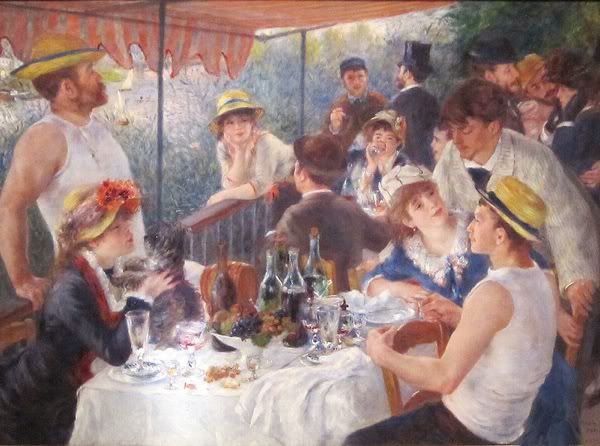Théodore is a wealth of information, being in regular contact with everyone in town because he is cantor and grocer's assistant, and what does everyone need? Food for the spirit and food for the physical body.
Eulalie is a retired maid or lady's companion and is now a regular visitor of Léonie. Eulalie's visits to Léonie are another example of habit, and of the discomfort of broken habits, since Léonie suffers greatly when she doesn't come or when she comes later than usual.
Uncle Adolphe, our hero's grandfather's brother, seems to have a love for theater, or at least for its women, and for "ladies of another class," as well. Our narrator's family will not associate with these women, but he sneaks an opportunity to do so and is disappointed to find that the actress (?) is not unlike other women. He is bothered by the fact that an immoral person could be so disguised as normal. Our narrator seems drawn to what is considered immoral, and yet repulsed by it.
The narrator's adoration of actors, even though he has yet to see a performance, is an example of obsession. It also fits into his tendency to compare life to art.
Social Triangles
Definitely a recurring theme. The narrator witnesses a triangle between Adolphe, the actress, and "the grand duke" that somewhat resembles (foreshadows) the triangle we see later with Swann and Odette. Also, the narrator is caught in a triangle that includes also his parents and his uncle, a triangle that because of miscommunication robs them all of each other's company.
Notable passages
"...thinking of the weary and fruitless novitiate eminent men would go through, perhaps for years on end, on the doorstep of some such lady who refused to answer their letters and had them sent packing by the hall-porter," (p.103) Foreshadowing/Swann
Interesting stuff:
Morris Columns (p.100) are cylindrical advertising structures on the sidewalks of Paris, a place for paper ads to be displayed. According to this article they've been a part of the Paris landscape for over 150 years, and their numbers have been (controversially) cut back in the last few.
Opéra-Comique (p.100)
Comédie-Française (p.101)
Diamants de la couronne and Domino Noir (p.101) are both works by Daniel Auber from the mid 19th century.
(p.102) Got, Delaunay, Febvre, Coquelin are real 19th century French actors, and I can find reference to a M. Thiron and Maubant as well.
(p.102) Sarah Bernhardt, Bartet, and Madeleine Brohan are all real 19th century French actresses. Jeanne Samary is also a real actress from the time, and was additionally a mistress of Renoir, showing up in many portraits, including the Luncheon of the Boating Party, which also includes our friend Charles Ephrussi (Swann). Art, mistress, Ephrussi...

I can find no reference to a Berma of the French theater, though.
Vocabulary
Blue (p.108) according to my book notes a blue, or bleu, is an "express letter transmitted by pneumatic tube (in Paris)"

No comments:
Post a Comment